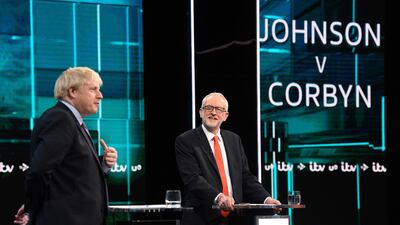Britain’s ruling Conservative Party has been accused of misleading voters after it changed the name of one of its Twitter accounts to “factcheckUK” during a televised election debate.
Twitter said it would take “decisive corrective action” if anyone tried a similar stunt again.
But Foreign Secretary Dominic Raab defended the move by the Conservative Campaign Headquarters saying that voters did not care about “the social media cut and thrust”.
"I knock on doors every day," he said on Wednesday. "No one gives a toss about the social media cut and thrust. What they care about is the substance of the issues, and of course there's a huge amount of scepticism about the claims of all politicians."

The UK government has said it is committed to combating the spread of fake news and disinformation.
In July, Mr Raab’s predecessor Jeremy Hunt pledged £18 million to counter fake news in eastern Europe and the western Balkans.
The account, which is followed by 76,000 users, changed its name back to “CCHQPress” after the debate on Tuesday evening between Prime Minister Boris Johnson and opposition Labour leader Jeremy Corbyn.
Twitter released a statement criticising the Conservative move.
"Twitter is committed to facilitating healthy debate throughout the UK general election," a Twitter spokeswoman said.
"We have global rules in place that prohibit behaviour that can mislead people, including those with verified accounts. Any further attempts to mislead people by editing verified profile information - in a manner seen during the UK Election Debate - will result in decisive corrective action."
Full Fact, an independent fact checking site, also accused the Conservative press office of misleading the public.
It is inappropriate and misleading for the Conservative press office to rename their twitter account ‘factcheckUK’ during this debate. Please do not mistake it for an independent fact checking service such as @FullFact, @FactCheck or @FactCheckNI
— Full Fact (@FullFact) November 19, 2019
"It is inappropriate and misleading for the Conservative press office to rename their Twitter account ‘factcheckUK’ during this debate. Please do not mistake it for an independent fact checking service," it said.
Twitter, alongside other social media sites, has come under fire from governments for failing to combat the spread of fake news, particularly during election campaigning.
The social media giant pledged last month to stop all political advertising, making the UK election on December 12 the first major test for the new policy.
Twitter also said it would make it easier to report misleading information about the election.
However, Liberal Democrats leader Jo Swinson was on Tuesday the victim of a fake news story that was shared thousands of times on Twitter as well as Facebook and Medium.
In a bizarre moment during the campaign, Ms Swinson was forced to deny she enjoyed shooting stones at squirrels.
“There was one using the byline of an established journalist. There was one that used Peter Walker’s name from the Guardian and he had to go online to debunk it and say he never wrote it,” the Lib Dem leader told LBC. “They’re quite sophisticated and people do believe them.”
Ms Swinson alongside the leader of the Scottish National Party Nicola Sturgeon lost a legal battle to be included in Tuesday's debate hosted by broadcaster ITV.
The debate saw Mr Johnson and Mr Corbyn clash over their policies on Brexit, the National Health Service (NHS) and the economy.
Mr Johnson repeatedly said he would "get Brexit done" unlike his rival, while Mr Corbyn accused the prime minister of trying to sell off the NHS to US health firms as part of his divorce deal.
A snap poll released immediately after the debate showed it was "dead heat" on who performed better between the two leaders.
A YouGov poll showed 51 per cent of the public said Mr Johnson had emerged the victorious while 49 per cent backed Mr Corbyn.
The debate is being seen as a win for Mr Corbyn by analysts, as the Labour leader and his party are trailing in the polls behind the Conservatives by around 12 points.

